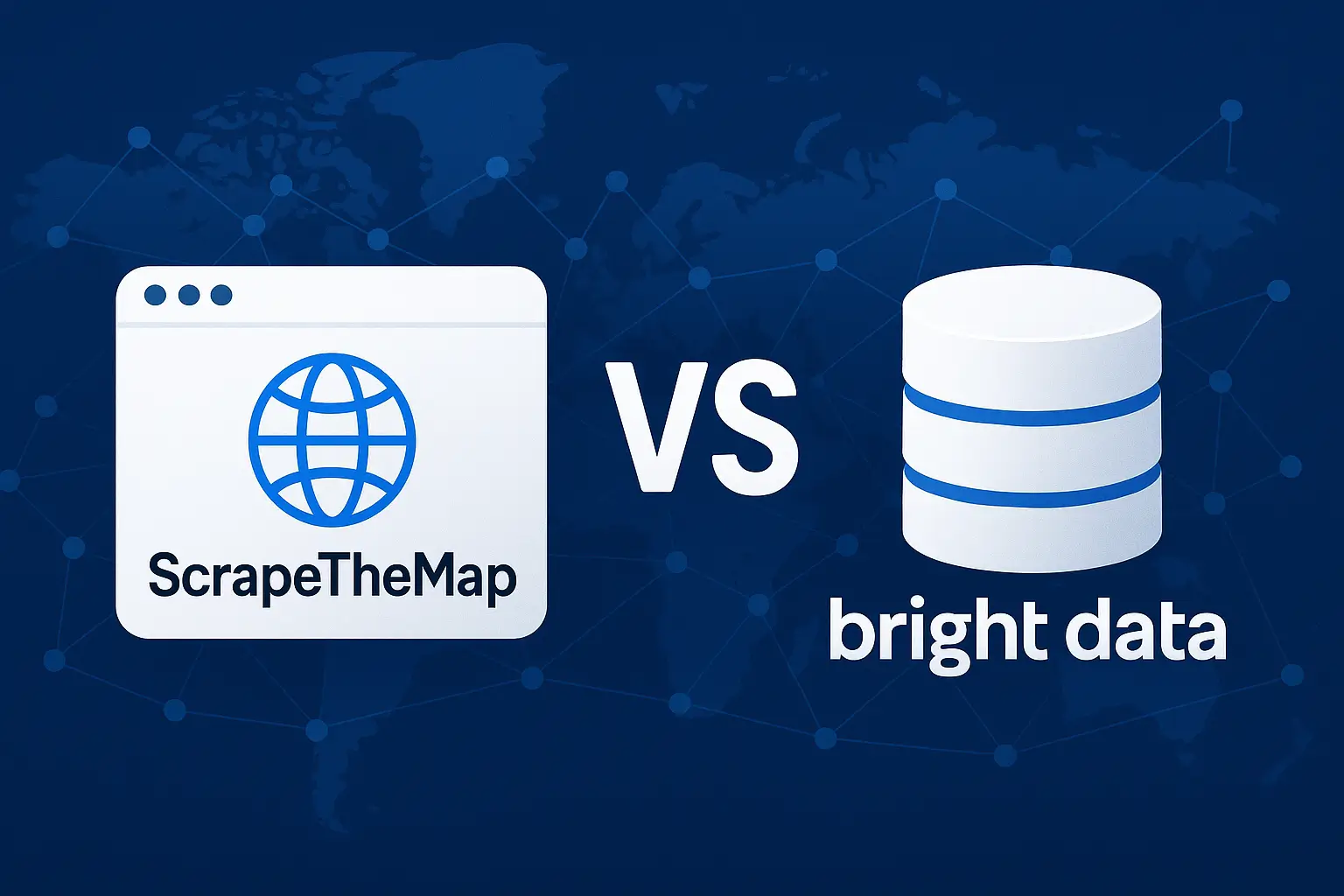ScrapeTheMap vs. Bright Data: Asset Ownership vs. Infrastructure SAAS
Explore how ScrapeTheMap's fixed-cost software asset compares to Bright Data's enterprise proxy infrastructure with analysis on pricing, personas, scaling, and TCO.

Compare Against the Enterprise Infrastructure Leader
ScrapeTheMap
4.8 (361 Reviews)
Bright Data
4.5 (1,000+ Reviews) [Source 5]
$99.00
Variable/TBD
One-Time License
Usage-Based (GB / Request / IP Type)
The Enterprise vs. The Asset: Infrastructure vs. Ownership
An impartial analysis comparing ScrapeTheMap’s fixed-cost, local-control software against Bright Data's global proxy network and high-volume, usage-based platform.
At a Glance: Core Differences
Bright Data is a powerful managed infrastructure suite with complex, usage-based billing. ScrapeTheMap is an owned software asset with a simple, fixed cost designed for specialized data targets.
| Feature | ScrapeTheMap | Bright Data |
|---|---|---|
| Primary Offering | Specialized Desktop Software | Global Proxy Network & API ✓ |
| Data Control & Residency | Local Machine Only ★ | Cloud Processing / Managed |
| Scaling Mechanism | User-supplied Proxies / Instances | Automated Load Balancing & Unlocking ✓ |
| Cost Structure | One-Time / Fixed Budget ★ | Complex, High-Volume Usage Fees |
| Target Complexity | Deeply optimized for a few hard targets | Any target via Web Unlocker / Proxies |
Who is it for? Scale and Focus
Deciding between the two depends entirely on your budget tolerance and scale requirements.
The Budget-Conscious Specialist
Independent consultants, small businesses, and analysts who need deep, specialized data (maps, reviews) and require a low, predictable TCO. You can manage your own proxies and prefer a local application.
- Massive TCO savings over subscription models.
- Engineered logic specifically for geo-targets.
- Data remains entirely on your infrastructure.
The Enterprise Data Team
Large companies, VC firms, and global data providers that require massive scale (billions of requests) against a wide variety of targets. Budget is secondary to reliability and the complexity of anti-bot bypass.
- Unrivaled proxy network (Datacenter, Residential, Mobile, ISP).
- Automated bot-detection handling (Web Unlocker).
- Full suite of data collection tools and APIs for integration.
Deep Dive: Critical Functionality
Managed Infrastructure vs. Bring Your Own Proxies
- Bright Data: Proxy Power. The core value is the massive, robust proxy network (Datacenter, Residential, Mobile, ISP) and the ability to handle retries and rotation automatically. You pay for this service by usage (traffic/requests).
- ScrapeTheMap: BYO Proxies. STM provides the scraping software and specialized logic; the user is responsible for supplying and managing their own proxy list. While this adds management overhead, it drastically reduces recurring vendor costs.
Out-of-the-Box vs. API Integration
- ScrapeTheMap: Simple Desktop App. Installation and setup are fast, focused on getting data immediately via a UI. The complexity of the specific target (e.g., Google Maps) is handled within the specialized module.
- Bright Data: API/IDE. While they offer some point-and-click tools (Data Collector), leveraging their full power, especially the Web Unlocker, often requires API integration or use of their proprietary Web Scraper IDE. It requires more technical skill and setup.
Cost Predictability: One-Time vs. Usage-Based
- ScrapeTheMap: Fixed and Low. $99 for the software. All subsequent costs are for the user's chosen proxy provider (which is separate and often much cheaper than using an integrated proxy service).
- Bright Data: High and Variable. Costs are highly dependent on volume (GB), IP type (Residential is expensive), and whether you use premium services like the Web Unlocker. Even small projects can quickly incur hundreds of dollars in monthly fees, forcing large minimum commitments.
Total Cost of Ownership (TCO) Calculator
The massive gap between a one-time software license and an enterprise usage-based platform is staggering. Bright Data's recurring minimums quickly dwarf the initial ScrapeTheMap investment.
1 Year view. Assumptions: ScrapeTheMap cost fixed at $99 (one-time license). Bright Data Low Volume estimated at $300/mo minimum usage. Bright Data High Volume estimated at $800/mo minimum usage. Both exclude the cost of external proxy services for STM, or highly volatile residential/unlocker fees for BD.
Conclusion: The Strategic Choice
This is not a comparison of capability, but of budget and scaling philosophy. Bright Data offers unparalleled infrastructure for enterprise scale, but at a huge, complex, and recurring cost. ScrapeTheMap offers a low-cost, fixed-budget tool for specialized data targets.
ScrapeTheMap Wins For:
Budget control, fixed TCO, local data residency, and maximizing value when the primary targets are complex geo-data or reviews.
Bright Data Wins For:
Massive, multi-target global scale, guaranteed uptime, and teams that require the most advanced managed anti-bot and proxy infrastructure regardless of cost.
For the majority of users who do not require billions of requests, ScrapeTheMap provides a strategic asset with significantly better cost predictability and ROI.
[Source 1] Bright Data Official Documentation: Proxy Network and Web Unlocker details.
[Source 2] Analysis of the cost complexity associated with usage-based billing models (GB, requests, IP types).
[Source 3] ScrapeTheMap's documentation on its specialized data modules for geo-targets.
[Source 4] Publicly advertised or common minimum spending thresholds for Bright Data's managed services (used for TCO calculation).
[Source 5] Aggregated user review scores from various public platforms. (Source counts updated for BD's large user base).